Climate Change and Its Impact on Healthcare Delivery in the USA
VerifiedAdded on 2023/01/20
|6
|1050
|43
Report
AI Summary
This report addresses climate change as a critical public health issue in the United States, emphasizing its effects on vulnerable populations like the elderly. It details the health challenges associated with climate change, including waterborne and foodborne diseases, mental health disorders, and cardiovascular issues. The report highlights the significant financial burden these health problems place on the healthcare system, particularly Medicare. It suggests mitigation strategies at local, state, and national levels, such as public health alerts during heat waves, reducing greenhouse gas emissions, creating more green spaces, and improving public transportation to manage and reduce the health impacts of climate change. The report also analyzes the cost of healthcare for the elderly population and how implementing these strategies could help minimize costs and increase the efficiency of healthcare delivery. The report references studies that support the claims and provides statistical data on healthcare spending.
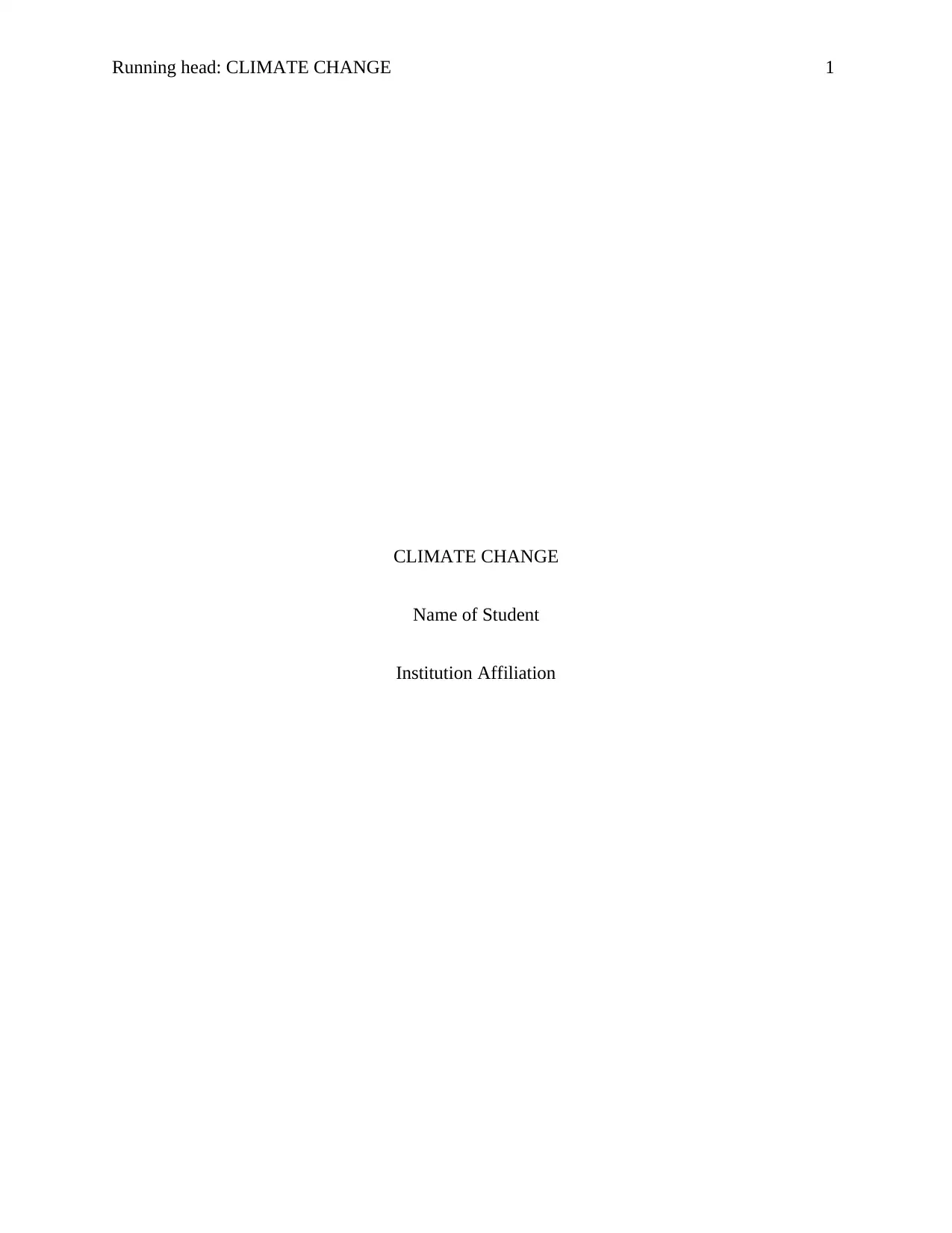
Running head: CLIMATE CHANGE 1
CLIMATE CHANGE
Name of Student
Institution Affiliation
CLIMATE CHANGE
Name of Student
Institution Affiliation
Paraphrase This Document
Need a fresh take? Get an instant paraphrase of this document with our AI Paraphraser
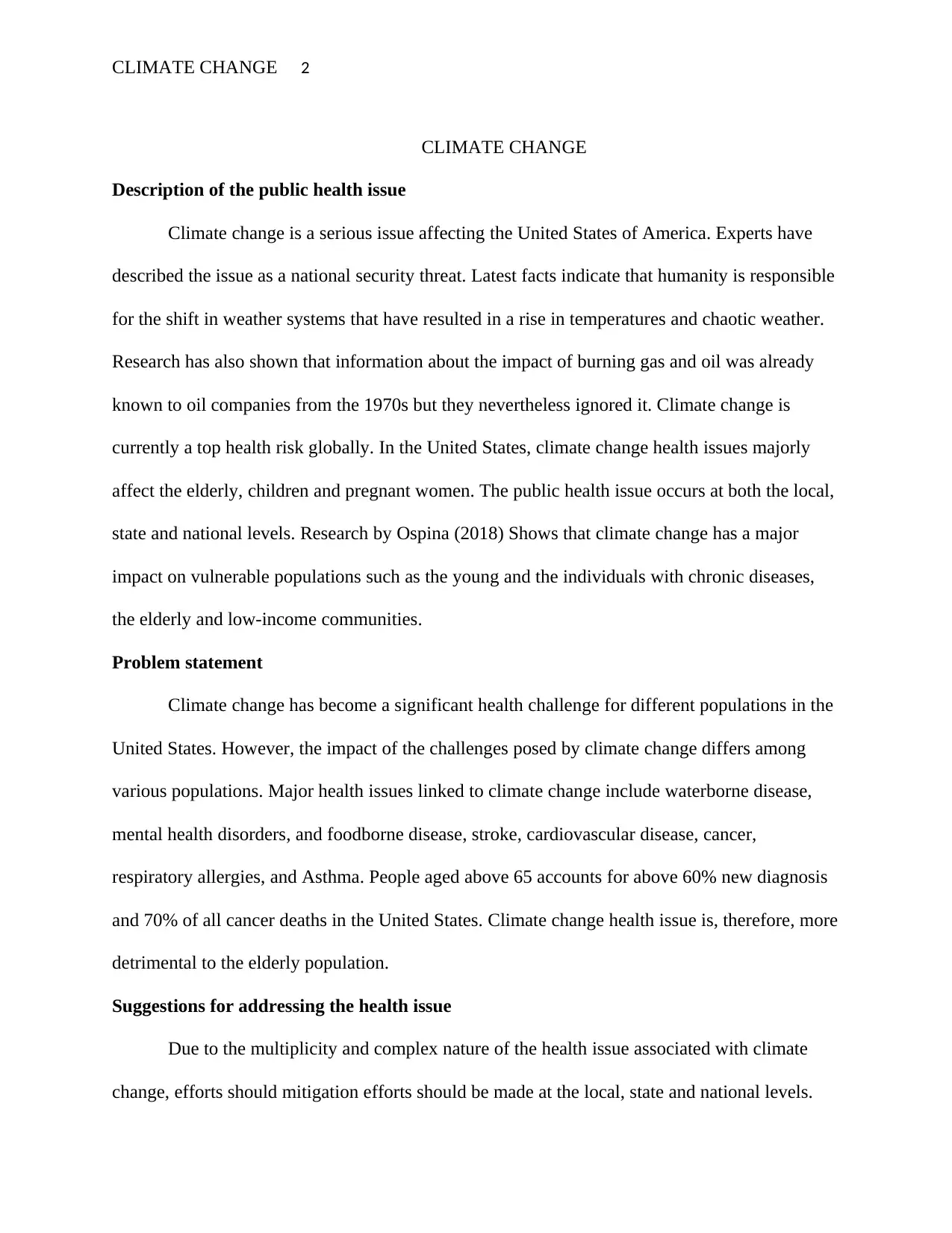
CLIMATE CHANGE 2
CLIMATE CHANGE
Description of the public health issue
Climate change is a serious issue affecting the United States of America. Experts have
described the issue as a national security threat. Latest facts indicate that humanity is responsible
for the shift in weather systems that have resulted in a rise in temperatures and chaotic weather.
Research has also shown that information about the impact of burning gas and oil was already
known to oil companies from the 1970s but they nevertheless ignored it. Climate change is
currently a top health risk globally. In the United States, climate change health issues majorly
affect the elderly, children and pregnant women. The public health issue occurs at both the local,
state and national levels. Research by Ospina (2018) Shows that climate change has a major
impact on vulnerable populations such as the young and the individuals with chronic diseases,
the elderly and low-income communities.
Problem statement
Climate change has become a significant health challenge for different populations in the
United States. However, the impact of the challenges posed by climate change differs among
various populations. Major health issues linked to climate change include waterborne disease,
mental health disorders, and foodborne disease, stroke, cardiovascular disease, cancer,
respiratory allergies, and Asthma. People aged above 65 accounts for above 60% new diagnosis
and 70% of all cancer deaths in the United States. Climate change health issue is, therefore, more
detrimental to the elderly population.
Suggestions for addressing the health issue
Due to the multiplicity and complex nature of the health issue associated with climate
change, efforts should mitigation efforts should be made at the local, state and national levels.
CLIMATE CHANGE
Description of the public health issue
Climate change is a serious issue affecting the United States of America. Experts have
described the issue as a national security threat. Latest facts indicate that humanity is responsible
for the shift in weather systems that have resulted in a rise in temperatures and chaotic weather.
Research has also shown that information about the impact of burning gas and oil was already
known to oil companies from the 1970s but they nevertheless ignored it. Climate change is
currently a top health risk globally. In the United States, climate change health issues majorly
affect the elderly, children and pregnant women. The public health issue occurs at both the local,
state and national levels. Research by Ospina (2018) Shows that climate change has a major
impact on vulnerable populations such as the young and the individuals with chronic diseases,
the elderly and low-income communities.
Problem statement
Climate change has become a significant health challenge for different populations in the
United States. However, the impact of the challenges posed by climate change differs among
various populations. Major health issues linked to climate change include waterborne disease,
mental health disorders, and foodborne disease, stroke, cardiovascular disease, cancer,
respiratory allergies, and Asthma. People aged above 65 accounts for above 60% new diagnosis
and 70% of all cancer deaths in the United States. Climate change health issue is, therefore, more
detrimental to the elderly population.
Suggestions for addressing the health issue
Due to the multiplicity and complex nature of the health issue associated with climate
change, efforts should mitigation efforts should be made at the local, state and national levels.
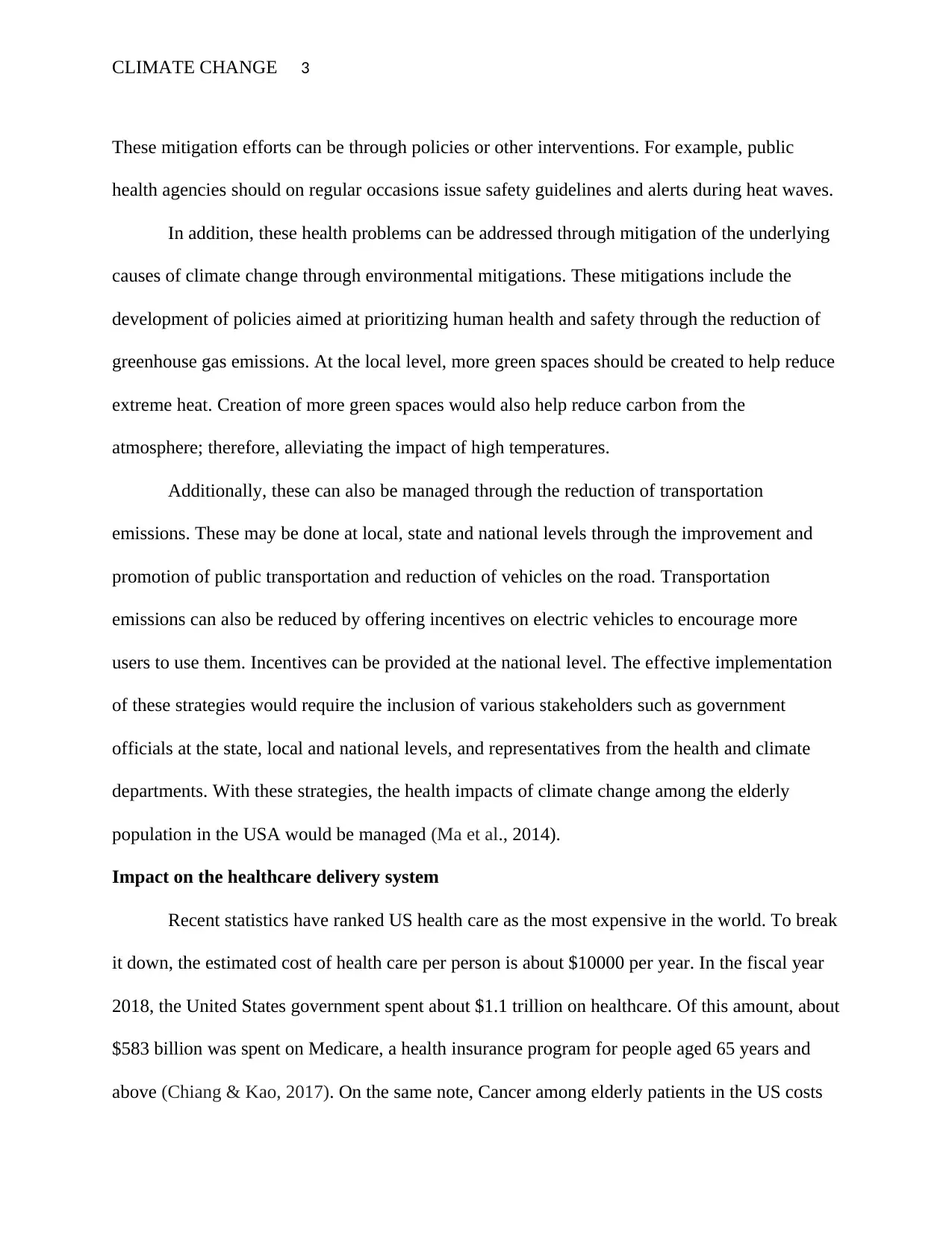
CLIMATE CHANGE 3
These mitigation efforts can be through policies or other interventions. For example, public
health agencies should on regular occasions issue safety guidelines and alerts during heat waves.
In addition, these health problems can be addressed through mitigation of the underlying
causes of climate change through environmental mitigations. These mitigations include the
development of policies aimed at prioritizing human health and safety through the reduction of
greenhouse gas emissions. At the local level, more green spaces should be created to help reduce
extreme heat. Creation of more green spaces would also help reduce carbon from the
atmosphere; therefore, alleviating the impact of high temperatures.
Additionally, these can also be managed through the reduction of transportation
emissions. These may be done at local, state and national levels through the improvement and
promotion of public transportation and reduction of vehicles on the road. Transportation
emissions can also be reduced by offering incentives on electric vehicles to encourage more
users to use them. Incentives can be provided at the national level. The effective implementation
of these strategies would require the inclusion of various stakeholders such as government
officials at the state, local and national levels, and representatives from the health and climate
departments. With these strategies, the health impacts of climate change among the elderly
population in the USA would be managed (Ma et al., 2014).
Impact on the healthcare delivery system
Recent statistics have ranked US health care as the most expensive in the world. To break
it down, the estimated cost of health care per person is about $10000 per year. In the fiscal year
2018, the United States government spent about $1.1 trillion on healthcare. Of this amount, about
$583 billion was spent on Medicare, a health insurance program for people aged 65 years and
above (Chiang & Kao, 2017). On the same note, Cancer among elderly patients in the US costs
These mitigation efforts can be through policies or other interventions. For example, public
health agencies should on regular occasions issue safety guidelines and alerts during heat waves.
In addition, these health problems can be addressed through mitigation of the underlying
causes of climate change through environmental mitigations. These mitigations include the
development of policies aimed at prioritizing human health and safety through the reduction of
greenhouse gas emissions. At the local level, more green spaces should be created to help reduce
extreme heat. Creation of more green spaces would also help reduce carbon from the
atmosphere; therefore, alleviating the impact of high temperatures.
Additionally, these can also be managed through the reduction of transportation
emissions. These may be done at local, state and national levels through the improvement and
promotion of public transportation and reduction of vehicles on the road. Transportation
emissions can also be reduced by offering incentives on electric vehicles to encourage more
users to use them. Incentives can be provided at the national level. The effective implementation
of these strategies would require the inclusion of various stakeholders such as government
officials at the state, local and national levels, and representatives from the health and climate
departments. With these strategies, the health impacts of climate change among the elderly
population in the USA would be managed (Ma et al., 2014).
Impact on the healthcare delivery system
Recent statistics have ranked US health care as the most expensive in the world. To break
it down, the estimated cost of health care per person is about $10000 per year. In the fiscal year
2018, the United States government spent about $1.1 trillion on healthcare. Of this amount, about
$583 billion was spent on Medicare, a health insurance program for people aged 65 years and
above (Chiang & Kao, 2017). On the same note, Cancer among elderly patients in the US costs
⊘ This is a preview!⊘
Do you want full access?
Subscribe today to unlock all pages.

Trusted by 1+ million students worldwide
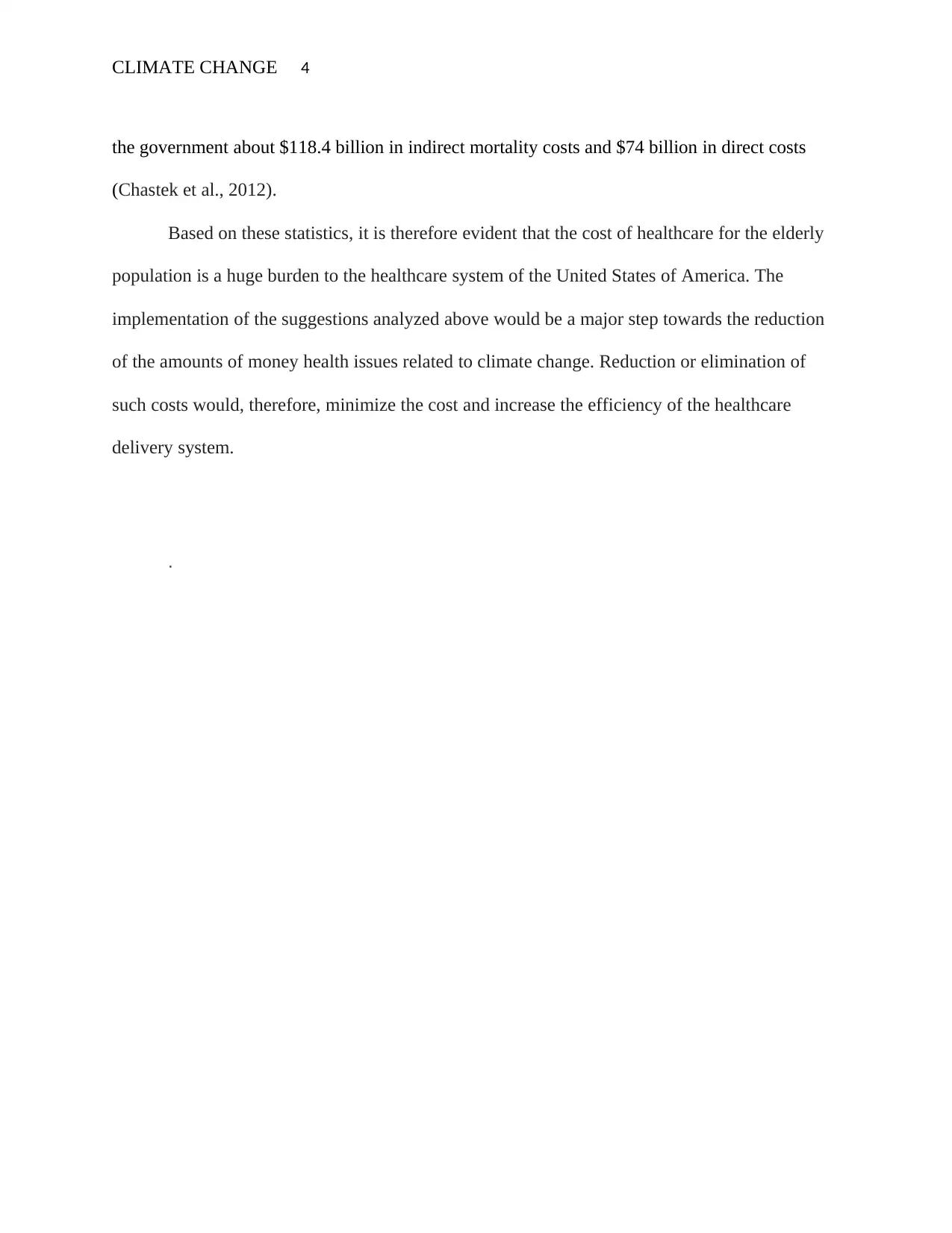
CLIMATE CHANGE 4
the government about $118.4 billion in indirect mortality costs and $74 billion in direct costs
(Chastek et al., 2012).
Based on these statistics, it is therefore evident that the cost of healthcare for the elderly
population is a huge burden to the healthcare system of the United States of America. The
implementation of the suggestions analyzed above would be a major step towards the reduction
of the amounts of money health issues related to climate change. Reduction or elimination of
such costs would, therefore, minimize the cost and increase the efficiency of the healthcare
delivery system.
.
the government about $118.4 billion in indirect mortality costs and $74 billion in direct costs
(Chastek et al., 2012).
Based on these statistics, it is therefore evident that the cost of healthcare for the elderly
population is a huge burden to the healthcare system of the United States of America. The
implementation of the suggestions analyzed above would be a major step towards the reduction
of the amounts of money health issues related to climate change. Reduction or elimination of
such costs would, therefore, minimize the cost and increase the efficiency of the healthcare
delivery system.
.
Paraphrase This Document
Need a fresh take? Get an instant paraphrase of this document with our AI Paraphraser
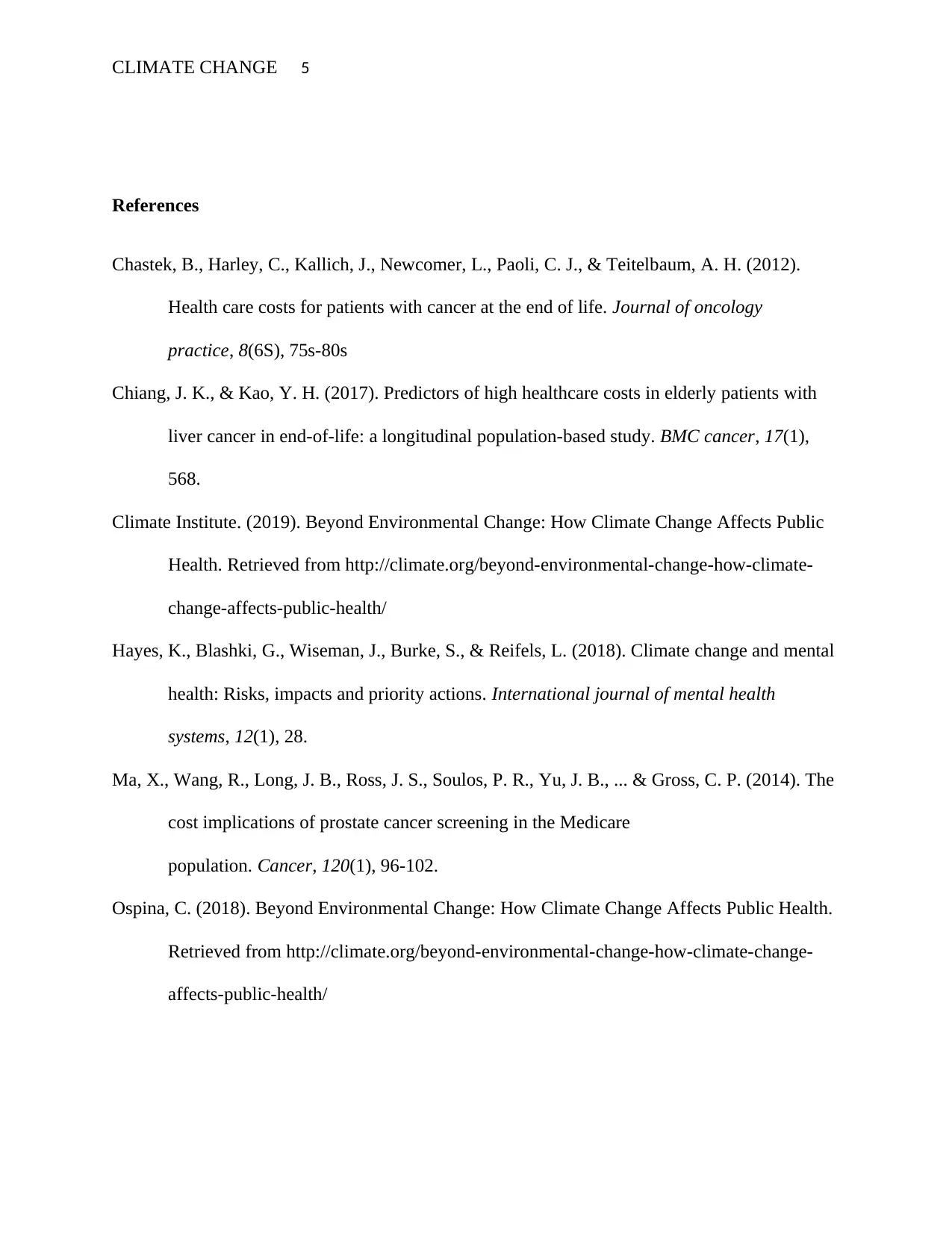
CLIMATE CHANGE 5
References
Chastek, B., Harley, C., Kallich, J., Newcomer, L., Paoli, C. J., & Teitelbaum, A. H. (2012).
Health care costs for patients with cancer at the end of life. Journal of oncology
practice, 8(6S), 75s-80s
Chiang, J. K., & Kao, Y. H. (2017). Predictors of high healthcare costs in elderly patients with
liver cancer in end-of-life: a longitudinal population-based study. BMC cancer, 17(1),
568.
Climate Institute. (2019). Beyond Environmental Change: How Climate Change Affects Public
Health. Retrieved from http://climate.org/beyond-environmental-change-how-climate-
change-affects-public-health/
Hayes, K., Blashki, G., Wiseman, J., Burke, S., & Reifels, L. (2018). Climate change and mental
health: Risks, impacts and priority actions. International journal of mental health
systems, 12(1), 28.
Ma, X., Wang, R., Long, J. B., Ross, J. S., Soulos, P. R., Yu, J. B., ... & Gross, C. P. (2014). The
cost implications of prostate cancer screening in the Medicare
population. Cancer, 120(1), 96-102.
Ospina, C. (2018). Beyond Environmental Change: How Climate Change Affects Public Health.
Retrieved from http://climate.org/beyond-environmental-change-how-climate-change-
affects-public-health/
References
Chastek, B., Harley, C., Kallich, J., Newcomer, L., Paoli, C. J., & Teitelbaum, A. H. (2012).
Health care costs for patients with cancer at the end of life. Journal of oncology
practice, 8(6S), 75s-80s
Chiang, J. K., & Kao, Y. H. (2017). Predictors of high healthcare costs in elderly patients with
liver cancer in end-of-life: a longitudinal population-based study. BMC cancer, 17(1),
568.
Climate Institute. (2019). Beyond Environmental Change: How Climate Change Affects Public
Health. Retrieved from http://climate.org/beyond-environmental-change-how-climate-
change-affects-public-health/
Hayes, K., Blashki, G., Wiseman, J., Burke, S., & Reifels, L. (2018). Climate change and mental
health: Risks, impacts and priority actions. International journal of mental health
systems, 12(1), 28.
Ma, X., Wang, R., Long, J. B., Ross, J. S., Soulos, P. R., Yu, J. B., ... & Gross, C. P. (2014). The
cost implications of prostate cancer screening in the Medicare
population. Cancer, 120(1), 96-102.
Ospina, C. (2018). Beyond Environmental Change: How Climate Change Affects Public Health.
Retrieved from http://climate.org/beyond-environmental-change-how-climate-change-
affects-public-health/

CLIMATE CHANGE 6
⊘ This is a preview!⊘
Do you want full access?
Subscribe today to unlock all pages.

Trusted by 1+ million students worldwide
1 out of 6
Related Documents
Your All-in-One AI-Powered Toolkit for Academic Success.
+13062052269
info@desklib.com
Available 24*7 on WhatsApp / Email
![[object Object]](/_next/static/media/star-bottom.7253800d.svg)
Unlock your academic potential
Copyright © 2020–2026 A2Z Services. All Rights Reserved. Developed and managed by ZUCOL.





